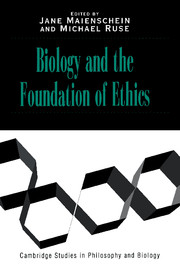Book contents
- Frontmatter
- Contents
- Introduction
- 1 Aristotle on the Biological Roots of Virtue: The Natural History of Natural Virtue
- 2 The Moral Status of Animals in Eighteenth-Century British Philosophy
- 3 From Natural Law to Evolutionary Ethics in Enlightenment French Natural History
- 4 French Evolutionary Ethics during the Third Republic: Jean de Lanessan
- 5 The State and Nature of Unity and Freedom: German Romantic Biology and Ethics
- 6 Darwin's Romantic Biology: The Foundation of His Evolutionary Ethics
- 7 Nietzsche and Darwin
- 8 Evolutionary Ethics in the Twentieth Century: Julian Sorell Huxley and George Gaylord Simpson
- 9 The Laws of Inheritance and the Rules of Morality: Early Geneticists on Evolution and Ethics
- 10 Scientific Responsibility and Political Context: The Case of Genetics under the Swastika
- 11 The Case against Evolutionary Ethics Today
- 12 Biology and Value Theory
- Notes on Contributors
- Index
2 - The Moral Status of Animals in Eighteenth-Century British Philosophy
Published online by Cambridge University Press: 06 July 2010
- Frontmatter
- Contents
- Introduction
- 1 Aristotle on the Biological Roots of Virtue: The Natural History of Natural Virtue
- 2 The Moral Status of Animals in Eighteenth-Century British Philosophy
- 3 From Natural Law to Evolutionary Ethics in Enlightenment French Natural History
- 4 French Evolutionary Ethics during the Third Republic: Jean de Lanessan
- 5 The State and Nature of Unity and Freedom: German Romantic Biology and Ethics
- 6 Darwin's Romantic Biology: The Foundation of His Evolutionary Ethics
- 7 Nietzsche and Darwin
- 8 Evolutionary Ethics in the Twentieth Century: Julian Sorell Huxley and George Gaylord Simpson
- 9 The Laws of Inheritance and the Rules of Morality: Early Geneticists on Evolution and Ethics
- 10 Scientific Responsibility and Political Context: The Case of Genetics under the Swastika
- 11 The Case against Evolutionary Ethics Today
- 12 Biology and Value Theory
- Notes on Contributors
- Index
Summary
INTRODUCTION
The contemporary debate over the moral status of animals reflects a mixture of traditions. Utilitarianism, which measures moral standing in terms of the ability to suffer, has been used to defend the widening-circle conception of morality. The difference between humans and other animals vis-à-vis moral standing diminishes in its light. Focusing on questions of agency, conscience, and reflective powers, the differences between humans and nonhumans seem greater. Darwinism has been invoked to bridge the gaps between the intellectual and moral capacities of humans and those of other animals. This has led some to argue either that differences in agency, conscience, and the power to reflect are overrated (e.g., Rodd 1990) or that they may not be absolute indicators of moral consideration (e.g., Rachels 1990).
Debates over the moral status of nonhuman animals have had a long and stormy history. The considerations that drive the current debate – questions of the intellectual capacities of animals, questions about their moral sensibilities, and questions about their sensitive capacities – are ancient (Sorabji 1993). Nonetheless, they first began to assume their modern form in the writings of the eighteenth-century British moral philosophers. Those individuals were struggling with the moral implications of (1) discoveries in the natural sciences and (2) an increasingly secularized approach to philosophical issues. Vivisection experiments and rudimentary anatomical studies not only showed that the bodies of animals were remarkably similar to the bodies of human beings but also showed that the brutes were capable of experiencing pain and suffering.
- Type
- Chapter
- Information
- Biology and the Foundations of Ethics , pp. 32 - 51Publisher: Cambridge University PressPrint publication year: 1999



